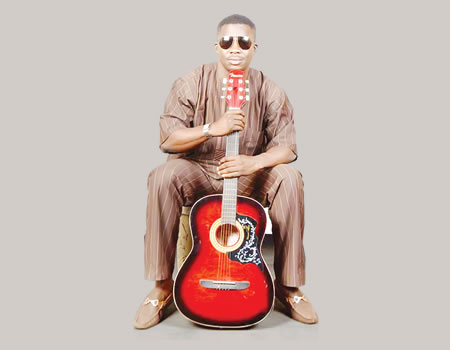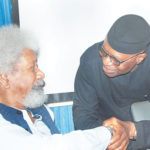Not much has been heard about your music career. What have you been up to?
It has been music all the way. I don’t think I would be tired of music. I have been busy with music engagements in the past few months and I am currently working on an album, which I am confident of its success when it is released.
You have been a juju singer for more than a decade, how would you describe the experience and the acceptance of your brand?
It has been awesome. I started more than a decade ago as you have said and the beauty of it is that I am doing what I really love to do. I started my music career as an instrumentalist in my mother’s church in Ibadan, in 1984 and I worked with famous musicians such as: Tayo Michael and Daniel Ajayi, before I formed a music group in 1996. I never set out to be a musician. Back then at Esa-Oke Polytechnic, Osun State, there was a strike as a result of the June 12 protest. We had to leave school. In that period when we were at home, I started paying attention to music. So, going to music was more like an accident because that was the only thing that I paid attention to at that time. It was not encouraging when I started back then, because it was not something that I really planned to do. I am happy that music has changed my life and took me to the heights I never thought I could get to. As of today, I have eight albums to my credit.
Some people say juju music does not have a future anymore, because the younger generation of juju singers are not doing enough to promote the genre. How does this make you feel?
I will put the bulk of the blame on the younger artistes. I told a colleague of mine recently that today’s crop of juju musicians are not focusing on the future; we are too conscious of fame. We are not paying attention on our work but rather what we want to sell. And, that’s really killing juju as far as I am concerned. We concentrate more on ourselves than what we are selling. Most of us are only chasing fame. That is not what people need from us. We must work hard to showcase quality music. It is glaring that we cannot compare our works with the elders, who pioneered the business. Another thing I realise is that most of us are yet to re-discover ourselves. We are not sure if we want to be a career musician or a business musician, though a career musician may not make it fast, because he needs to be creative and being creative is not something you can joke with.
How have you been able to sustain the Adonai band for more than 10 years?
It has not been easy sustaining a brand for 10 years, especially when you have quite a number of people doing what you can do. There has to be something special about you that will give you an edge. I have remained focused over the years. I have also refused to live in the shadow of anybody.
Would you encourage collaboration from artistes from another genre?
This should not be a problem among artistes. I think it should be encouraged as it would promote unity and harmony among the practitioners. I welcome collaborations with open arms. There is need for collaboration in the music industry, irrespective of the personalities involved.
How do you rate yourself among your colleagues. Do you sometimes feel threatened?
I am not in any way threatened because my style of music stands out. I have a pattern of music that is distinctively different from others. Having said that, I see everybody as colleagues pursuing a collective goal- to entertain our fans and make money in return. The Adonai brand has come to stay and we will continue to work hard to push it even higher by God’s grace.
With your level of success in the music business, who do you look up to as a motivation?
I look up to God to keep giving me the needed strength to succeed. The veterans in the industry, especially those who are in the juju business are also a big motivation because of their humility.
Are you comfortable with the dimension juju music has taken recently?
I believe we are all working hard to get there. We are improving by the day. I am not the type that criticises people’s works. I always encourage them to get better. I believe that our lyrics may be different, but whether it is fuji, hip-hop or juju, music is music. I came from a juju music family background and we have three kinds of juju music: the models King Sunny Ade, Evangelist Ebenezer Obey and Sir Shina Peters have pioneered for years. The tempo was a bit slow when Ebenezer Obey and KSA started, but it was raised when Sir Shina Peters came on the scene. These are people we all look up to because they have shown over the years that they are living legends in the game.
With your submission, would you say that Sir Shina Peter is the one who changed the phase of juju music?
No, that is not what I was trying to explain. I meant that he was the one who raised the tempo of juju music. I am a beneficiary of the initiative, because it has been a blessing to me.
Is it true that juju musicians are promiscuous and how do you manage your own female admirers?
This is not true. Personally, I used to tell people that my case is different. I studied Banking and Finance and I have been in the field that is mostly populated by ladies. It is not strange to me. I have been able to draw a line whenever it is becoming out of hand. I only appreciate and treat them as fans. You will agree with me that musician are always careful in handling fans; irrespective of gender. We must not turn down any fan. On the other hand, my status as an apostle doesn’t give room for that. I see myself as an ambassador of Christ and I am very conscious about that.






